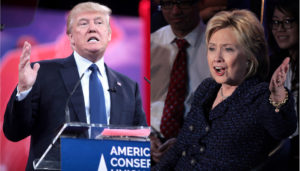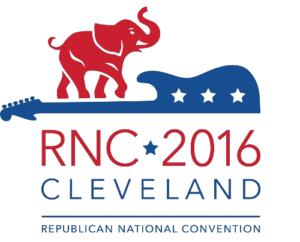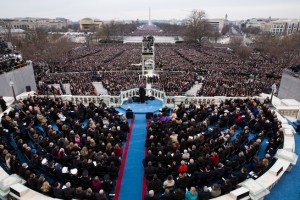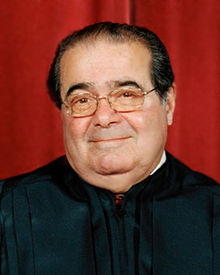The U.S. government lectures other countries about “democracy” – and finances internal opposition in the name of “democracy promotion” – but its own behavior falls far short of democratic norms, says ex-CIA analyst Paul R. Pillar.
By Paul R. Pillar
The health, or sickness, of democracy in foreign countries has long been a matter of concern in the United States, notwithstanding disagreements regarding exactly what the United States can, or should, do to promote democracy abroad. Consider the case of the following country — for now, let us call it Slobbovia — as outsiders would view it and as it might be the subject of something equivalent to a State Department dispatch or a report from a nongovernmental organization concerned with democracy.

Republican presidential nominee Donald Trump and Democratic nominee Hillary Clinton. (Photos by Gage Skidmore and derivative by Krassotkin, Wikipedia)
Slobbovia has a legal and constitutional structure that provides for political and civil rights and is in the form of a representative democracy with built-in checks and balances. In practice, much political activity derives not from that legal and constitutional framework but instead consists of crude use of levers of power by those with access to those levers.
Elements with the most power routinely show less regard for democratic procedures than for solidification of their own party’s power. Ultimate motivations for such behavior may include retention of power for its own sake and the advancement of minority economic interests that would be unable to prevail under majority rule.
The ruling party — the party that as of later this month will be in full control of both the executive and legislative branches of the national government — aggressively uses non-democratic means to preserve and expand its position. Among these has been enactment at the state level — where the ruling party also controls most of the legislatures — of laws designed to impede voting by citizens deemed more likely to vote for the opposition, by imposing requirements difficult for many of those citizens to meet. The rationale for such laws has been to counter voting fraud, even though such fraud has been so rare as to be almost nonexistent.
The voter suppression laws have effectively disenfranchised what is probably a substantial, although admittedly impossible to quantify, portion of the electorate. The rationale — echoed by the incoming president, who has made accusations, without support, of widespread voting fraud — also has undermined confidence in Slobbovian democracy.
Gerrymandering Voting Districts
Both the ruling party and the principal opposition party extensively manipulate the boundaries of legislative districts to benefit their own party and to entrench incumbents, but this practice has disproportionately benefited the ruling party because of its control over most state legislatures, where the manipulative line-drawing occurs.
Because members of state legislatures can draw their own district boundaries, this districting technique is another way for a minority to continue in power even after it has lost whatever majority support it once had. At the national level, the manipulation of district lines has enabled the ruling party to retain a majority of seats in the lower house of the legislature even when it has won fewer votes than the opposition party did.
The ruling party also benefits from an archaic feature of Slobbovian presidential elections — a holdover from a system devised partly to propitiate slave-holding interests — in which the candidate winning the most votes does not necessarily get the presidency. This has happened twice in the last five presidential elections. The oddity was especially marked in the most recent election, in which the presidency is being given to a candidate who finished a full two percentage points behind the opposition party’s candidate.
When the opposition party has managed despite these handicaps to make inroads — as it did in winning the two previous presidential elections — the dominant party has used its position in the national legislature to flout the majority will and to impede the ability of the other party to govern. Its techniques have included a form of extortion in which, lacking the votes to enact its policies through normal democratic means, it threatens to shut down the government altogether or to destroy Slobbovia’s credit rating through a debt default if it does not get its way.
The party’s leader in the upper house of the national legislature openly declared his intention, as his highest priority, to make the president a failure. He and his party acted consistently with that declaration. This approach included automatic and total opposition to what was the principal domestic policy initiative of the day, even though this meant the party did not have any alternative to offer once it regained full control of the policymaking branches of government.
Controlling the Courts
The ruling party has placed heavy emphasis on controlling as well the judiciary, which is significant in that Slobbovia’s highest court has become in effect another policymaking branch of government, with justices in ideological camps that clearly correspond to the preferences of the two major political parties.
The death a year ago of one justice threatened a loss of the dominant party’s hold on the court. The party’s members in the upper house of the legislature — which the constitution says must provide advice and consent regarding presidential appointments to the court — disregarded that constitutional provision and refused to consider the incumbent president’s nominee, even though it meant the vacancy would last at least a year and the nominee in question was a moderate.
The sympathy of a majority of the court toward the dominant party’s ideology has played a major role in increasing the part of money in Slobbovian politics, especially by striking down legislation intended to regulate money’s role in election campaigns. Slobbovia is no kleptocracy, and for the most part the role of money in politics does not take the form of what is undeniably corruption, as it does in many other countries.
It is worthy of note, however, that the first attempted action by the ruling party’s members in the lower house of the newly convened national legislature was to disable an office with the mission of investigating corruption among members. The action was scuttled after it provoked outrage. (The incoming president criticized the timing, but not the substance, of the attempted disabling of the office.)
The increasing role of money is instead more a matter of deference to minority moneyed interests, based on disproportionate access of those interests to the corridors of power, at the expense of majority interests as would be expressed through democratic means. This trend involves the flouting of previous custom and in some respects the flouting of law.
The incoming president, contrary to the practice of his predecessors, refuses to disclose fully his financial interests and specifically his tax returns. He is a businessman with worldwide interests that he is not divesting, making it almost inevitable that during his administration there will be violations of a provision in the Slobbovian constitution that prohibits U.S. officials from receiving private gain from foreign governments. The intermingling of public business with private business interests also involves members of the President’s family who evidently are going to have hands in both, notwithstanding Slobbovian law that is supposed to restrict nepotism. Some observers have even seen similarities to family rule in North Korea.
Some senior appointees of the incoming president who also have extensive private interests that could conflict with the public interest appear likely to be confirmed in their appointments even though they have failed to complete ethics-related submissions that are supposed to be required for confirmation. The financial donations that some wealthy nominees have made to the same members of the upper house who will be voting on their nominations may have something to do with this outcome.
Also of concern regarding the intermingling of private and public interests are informal advisers who have extensive financial interests that would be affected by policy decisions and whose grey-area status keeps them outside even the ostensible legal restrictions that apply to formally appointed officials.
An Unfavorable Trend
An overall assessment of the state of democracy in Slobbovia must begin with the observation that this is a nation with a long history and strong tradition of representative democracy. But this tradition is visibly and seriously eroding. The trend is unfavorable.

President Barack Obama delivers his Inaugural Address at the U.S. Capitol in Washington, D.C., on Jan. 21, 2013. (Official White House Photo by Chuck Kennedy)
The defects in Slobbovian democracy are growing and becoming more obvious. This country is increasingly a place where minority interests can, and do, use nondemocratic means to prevail over the will and interests of a majority. As both a cause and effect of this pattern, the aspects of political culture that, at least as much as constitutional and legal provisions, are critical to the sustaining of a liberal representative democracy have been weakening. The most important aspect of such culture is widespread acceptance that observing and nourishing democratic norms themselves are more important than any one policy outcome or the fortunes of any one political party. Too often this is not the set of priorities one observes.
Realizing that this particular Slobbovia is actually the United States, one can get a sense of how non-Americans are viewing American democracy. This in turn can have implications for democracy in the observers’ own lands. Right now there is uncertainty about what effect the direct actions of the incoming Trump administration will have on democracy abroad.
Anne Applebaum expresses a pessimistic view that Trump, far from promoting any expansion of democracy, may undermine hitherto well-established democracies in Europe by making common cause with racist and anti-immigration elements in hard-right nationalist movements.
Democracy scholar Thomas Carothers believes, somewhat more optimistically, that “as Trump and his team move to actual policymaking,” their support for democracy and human rights abroad “will prove less consistently negative than their initial signals might indicate.”
Carothers correctly identifies, however, the biggest negative of all: “Various problematic features of U.S. political life in recent years — the institutional gridlock, the ever-rising role of money in politics, and the frequent skirmishing over basic electoral rules and procedures — have already tarnished the United States’ image abroad.
But the recent U.S. presidential election process damaged this image much more widely and deeply. Although this damage had many sources, numerous actions that Trump took during the campaign and since the election — from his vows to prosecute his main opponent to his baseless postelection assertions of massive electoral fraud — figure significantly in the dispiriting diminishment of America’s global political brand.”
For anyone interested in expanding democracy abroad, this is a reason for deep pessimism. America is more likely to be successful in encouraging such expansion by setting an example than by direct manipulation or intervention. Because stable democracy requires those critical elements of political culture — including genuine and willing commitment to democratic procedures themselves — it must arise in large part inwardly, even if inspired by a salient example such as the United States, rather than being imposed from the outside.
For all Americans, the biggest reason to be bothered by the trends in American democracy is that it is their own country. That is a reason to be pessimistic even if not giving a hoot about the expansion of democracy abroad.
That is also one of the biggest problems to think about in connection with the alleged Russian interference in the U.S. election. Primary among the likely Russian motives, as suggested in the official government report on the Russian initiative, was “to undermine public faith in the U.S. democratic process.” Sure, what the Russians allegedly did is worthy of condemnation, but Americans ought to be most disturbed by the fact that there already were enough reasons to shake such faith that the Russians would have known they had a vulnerable target. The recent election, with or without Russian interference, provided still more reasons.
Paul R. Pillar, in his 28 years at the Central Intelligence Agency, rose to be one of the agency’s top analysts. He is author most recently of Why America Misunderstands the World. (This article first appeared as a blog post at The National Interest’s Web site. Reprinted with author’s permission.)


“The voter suppression laws have effectively disenfranchised what is probably a substantial, although admittedly impossible to quantify, portion of the electorate.” Sorry, wrong. Greg Palast HAS quantified it: (What does “admittedly” mean? Admitted by whom?)
http://www.gregpalast.com/election-stolen-heres/
America needs to learn one thing: stop meddling in the affairs of other nations. The “American way of life” doesn’t suit everyone. Live and let live and then perhaps we have a chance of having a more peaceful Earth.
I wonder, when has the US supported democracy abroad? Allende, Mossadeq, Sukarno, Arbenz, Aristide, Lumumba, the Sandinitstas, and countless others were democratically elected but overthrown by the US?
For that matter, when was this mythic period of “liberal democracy” in the US? Was it before the Palmer Raids? Between that and the HUAC? Or during Hoover’s Cointelpro? Was it on display during the breakup of Occupy?
Is the Gerrymandering by Republicans that much worse than the bipartisan obstacles erected for Third Parties for ballot and debate access? Is it worse than the Democrats redistricting one of its few members with integrity out of his seat (Kucinich), or putting the party’s thumb on the scale to defeat Sanders?
Is threatening to prosecute Hillary for the crimes no rational person can deny that she did somehow worse than the imprisonment of Debs for refusing to support war, or Chelsea Manning for letting the truth about war being known? Is it worse than chaining Jill Stein to a desk at a black site to keep her away from reporters on charges that video evidence clearly shows she did not commit?
Is the cotntrol of Republicans by a moneyed minority any different than control of the Democrats by a monied minority?
Raul, I am glad to see you are now on the side of (small d) democracy, but I have to wonder, where have you been, that you think that its destruction in the US is somehow a new thing? I know you are smart enough that you already knew all of which I mention here.
If anything Drumpf’s acendance is already showing benefits, simply by removing the mask that people like you have been deluding yourselves with. I do hope that your purpose is not just to put that mask back on so that you can go back to your delusions.
Hear, hear.
Very good. (You didn’t mention the genocide of Native Americans or the centuries-long enslavement of Africans, but what the hell, nobody’s perfect and there’s just so much space!)
God’s Messenger – great post.
Washington DC is Mordor. Congress, and the President and Vice President are immoral and unethical and do not care about the American people. Everything they do is the exact opposite of democracy and freedom. They allow corporations to take the rights of workers so workers are treated as slaves (e.g. TPP and employment law), they destroy countries all around the world to promote unethical and immoral corporations and countries (e.g. Syrian pipeline plans), they turn a blind eye to the suffering of the American people (e.g. lowest worker participation rate in decades), they lie about the unemployment rate (i.e. its in the 20’s), they lie about weapons of mass destruction and the cause to go to war (e.g. Iraq), they break the rule of law and make laws that only benefit them and their friends (e.g. taxes, employment law, business law, contract law, etc), they start wars for banks and the military industrial complex that kill millions (e.g. every conflict since WWII), and they saddle Americans with healthcare burdens to weaken American families and drive them into poverty (i.e. Obamacare).
Their lies regarding the US economy and their designed system to reduce the American people to poverty are responsible for the death of millions of Americans and the highest suicide rates and drug use in history.
This government, like all other governments around the world, is evil.
All of the problems faced by global population can be traced back to globalism and elites in government, business, and religion who view the rest of us as brain-dead idiots who should be ruled by their psychopathy and their evil actions.
It is time for good and decent Americans to put an end to the evil of Mordor and get rid of Sauron and his orks. This government makes me physically ill! And their evil reaches to heaven. God is not amused. Believe me!
By the way, for any of you “code” globalists in the CIA, etc. – the word “Sharia” does not mean “SHARE”. Isn’t it funny how the will of the people and populism and push back against immigration tyranny and spreading wars to force immigration leads to people rebelling against slavery?
God works in mysterious ways – or maybe God and God’s codes only makes sense to those who understand that slavery is for ant populations – not those that are supposed to be made in the image of God.
Tick tock evil governments in the US and around the world – tick tock. God is always watching and judgment is coming.
The above committee is called the Office of Congressional Ethics. Another article spells out the important work that they do; it makes sense that somebody is watching what the politicians are doing, other than the politicians themselves. The problem is that these committees can end up being just full of politics too. I can see the reason for having them, though.
http://www.vox.com/policy-and-politics/2017/1/3/14153198/office-congressional-ethics-house-republicans
“It is worthy of note, however, that the first attempted action by the ruling party’s members in the lower house of the newly convened national legislature was to disable an office with the mission of investigating corruption among members. The action was scuttled after it provoked outrage. (The incoming president criticized the timing, but not the substance, of the attempted disabling of the office.)”
Brit Hume explains the other side of the story re the ethics oversight board in the following short four-minute video clip:
https://www.youtube.com/watch?v=04W_bdeNcpk
This board had no subpoena power. All it could really do was make recommendations to the House Ethics Committee, which remains in place. He said they could receive anonymous tips, investigate them in whatever way they could, and then publish them. So what you had was sort of half-finished, half-baked investigative material being released. An unelected body, advising the House Ethics Committee, who had no power to begin with.
It just seems weird that the Republicans would waste their time and pick a fight with this unelected body for no reason. I wonder if they’ve done something that so upset the Republicans that they went after them. Time will tell, I guess.
And here’s Congressman John Lewis of Georgia embracing democracy (not!):
“Democratic Rep. John Lewis says he’s doesn’t consider Donald Trump a “legitimate president,” blaming the Russians for helping the Republican win the White House.
The Georgia congressman and leader in the civil rights movement of the 1960s said he will skip next week’s inauguration of Trump at the Capitol, joining several other Democrats who have decided to boycott the historic event.
“You know, I believe in forgiveness. I believe in trying to work with people. It will be hard. It’s going to be very difficult. I don’t see this president-elect as a legitimate president,” Lewis said in an interview with NBC’s “Meet the Press” that will air on Sunday.
“I think the Russians participated in helping this man get elected. And they helped destroy the candidacy of Hillary Clinton,” Lewis said.”
http://www.chicagotribune.com/news/nationworld/politics/ct-john-lewis-trump-20170113-story.html
No, no fault directed at his own candidate; the Russians did it! How is it that someone with such limited intellect can possibly have served 16 terms? How is this possible?
Mr. Pillar is generally correct about problems with our own democracy but wrong to suggest that America has any real interest in promoting democracy abroad. I’m sure that many people engaged in such activities really believe that is what they are doing, when in fact it is a tool to weaken governments we want replaced with friendlier ones. Its ugliest form has been regime change using violence as its principle weapon. As to Pillars assertion that the fault lies to a greater extent with the Republican Party, the problem is more basic that that, that the abuses occur by whichever party has the upper hand. Perhaps I misread him on that.
Yes, if the US so much valued democracy it would never have allowed its own mass media and elections to be corrupted by money. The young idealists recruited to NED and even the Dems, simply assume that respectable-looking leaders are not scammers. This is their first lesson in democracy, that we don’t have one, and many of them will fight that truth for many years. They don’t want to make the investment of time and sadness into citizenship, for it is much easier to go along with the happy crowd. We’re the best because we wish we were. Like most groups of sheeple.
The article attempts to blame the negative foreign view of US “democracy” on “actions that Trump took during the campaign and since”, rather than the proven manipulation by the Dems, and claims that alleged “Russian interference” in exposing Dem corruption was “worthy of condemnation” despite the leaked info being true and necessary to voters, and despite the lack of evidence of Russia involvement. This is a political attempt to deflect attention from corruption and to cause international problems to benefit the corrupt.
The Dems are proven to be agents of Israel/KSA/MIC. That is the story. The Reps always were for sale to the highest bidder.
America has “exported” so much “democracy” there is none left at home.
Ask us for help, and we can export some back to you.
Excellent post
The USA has such an inflated view of itself I wish they would stay home and allow countries to work out their own development issues
As for this writer featuring Anne Applebaum in a peace about democracy!!!
To quote Trump “gimme a break”